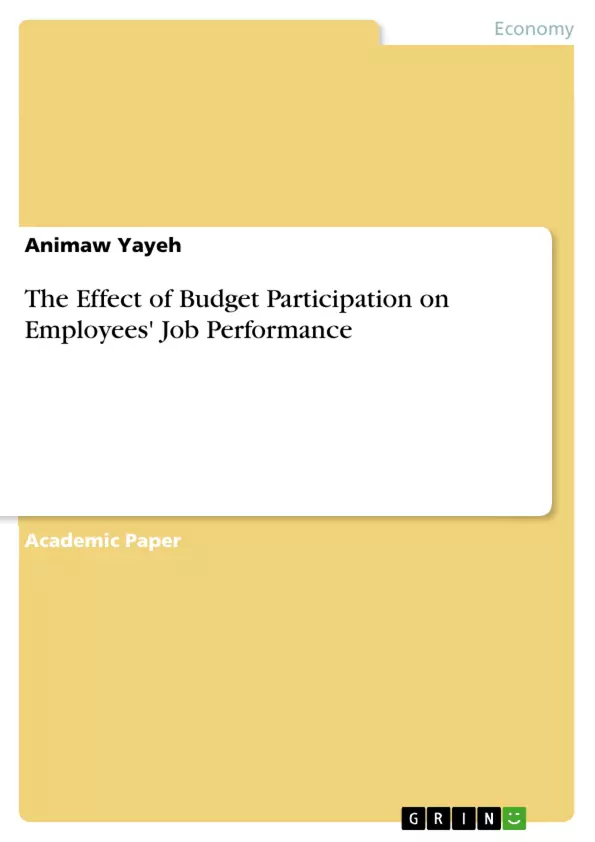This paper investigated the effect of budget participation on job performance in one of the public sectors the Amhara National Regional State (ANRS) HIV/AIDS Prevention Control and Co-ordinations Office (HAPCCO).
While studying the relationship between budget participation and job performance the following variables are used as mediating variables: role ambiguity, organizational trust, organizational commitment and budget adequacy. The study is significant for HAPCCO management and regional policy makers on how to improve the office’s performance by considering different variables and other researchers who wish to use the same method and sector/s.
Quantitative research design is used. Primary data are collected using structured questionnaire from a sample of 54 employees of HAPCCO selected using stratified random sampling. For data analysis descriptive statistics, correlation, regression and path analysis techniques are employed.
The result of the study indicated that budget participation has a direct but insignificant effect on job performance. Besides, budget participation has an indirect positive and significant effect on job performance through mediating variable. Mediating variables have a positive and significant relationship with budget participation with the exception of organizational commitment.
Inhaltsverzeichnis (Table of Contents)
- 1. INTRODUCTION
- 1.1 BACKGROUND OF THE STUDY
- 1.2 STATEMENT OF THE PROBLEM
- 1.3 OBJECTIVE OF THE STUDY
- 1.4 RESEARCH QUESTIONS
- 1.5 HYPOTHESIS
- 1.6 SIGNIFICANCE OF THE STUDY
- 1.7 SCOPE OF THE STUDY
- 1.8 LIMITATION OF THE STUDY
- 1.9 ORGANIZATION OF THE STUDY
- 2. REVIEW OF THE LITERATURE
- 2.1 DEFINITIONS AND MEASUREMENT OF DEPENDENT VARIABLE - JOB PERFORMANCE
- 2.2 DEFINITIONS AND MEASUREMENT OF INDEPENDENT AND MEDIATING VARIABLES
- 2.3 THEORETICAL LITERATURE ON THE RELATIONSHIP BETWEEN INDEPENDENT VARIABLES, MEDIATING VARIABLES AND DEPENDENT VARIABLES
- 2.4 EMPIRICAL LITERATURE ON THE RELATIONSHIP BETWEEN INDEPENDENT VARIABLE, MEDIATING VARIABLES AND DEPENDENT VARIABLES
- 2.5 HISTORICAL REVIEW OF ANRS HAPCCO
- 2.6 SUMMARY OF LITERATURE
- 3. RESEARCH METHODOLOGY
- 3.1 RESEARCH DESIGN
- 3.2 TYPE OF DATA AND SOURCE
- 3.3 OPERATIONAL DEFINITIONS
- 3.4 MEASUREMENT OF VARIABLES
- 3.5 DATA COLLECTION METHODS
- 3.6 DATA ANALYSIS METHODS
- 4. RESULTS AND DISCUSSION
- 4.1 RESPONSE RATE
- 4.2 RELIABILITY TEST
- 4.3 FACTOR ANALYSIS
- 4.4 DESCRIPTIVE STATISTICS OF THE VARIABLES
- 4.5 CORRELATIONS BETWEEN PREDICTORS AND DEPENDENT VARIABLES
- 4.6 REGRESSION ASSUMPTION CHECKS
- 4.7 REGRESSION AND PATH ANALYSIS RESULT
- 4.8 DISCUSSION
- 5. CONCLUSIONS, RECOMMENDATIONS AND SUGGESTIONS FOR FUTURE RESEARCH
- 5.1 CONCLUSIONS
- 5.2 RECOMMENDATIONS
- 5.3 SUGGESTIONS FOR FUTURE RESEARCH
- REFERENCE
- APPENDIX
Zielsetzung und Themenschwerpunkte (Objectives and Key Themes)
This thesis investigates the impact of budget participation on employee job performance in the Amhara National Regional State HIV/AIDS Prevention, Control and Coordination Office (ANRS HAPCCO). It aims to determine the relationship between budget participation, job satisfaction, perceived organizational support, and employee performance within the organization.
- The effect of budget participation on employee job performance
- The role of job satisfaction as a mediating factor in the relationship between budget participation and job performance
- The influence of perceived organizational support on employee performance
- The applicability of budget participation strategies in the context of public health organizations
- The implications of the findings for improving employee performance and organizational effectiveness
Zusammenfassung der Kapitel (Chapter Summaries)
- Chapter 1: Introduction: This chapter introduces the study's background, problem statement, objectives, research questions, hypothesis, significance, scope, limitations, and organization.
- Chapter 2: Review of the Literature: This chapter delves into the theoretical and empirical literature on the relationship between budget participation, job performance, job satisfaction, and perceived organizational support. It also provides a historical overview of ANRS HAPCCO.
- Chapter 3: Research Methodology: This chapter outlines the research design, data sources, operational definitions, measurement of variables, data collection methods, and data analysis methods used in the study.
- Chapter 4: Results and Discussion: This chapter presents the findings of the study, including response rates, reliability test results, factor analysis, descriptive statistics, correlations between predictors and dependent variables, regression assumption checks, and regression and path analysis results. It also provides a detailed discussion of the findings.
Schlüsselwörter (Keywords)
This study focuses on the key concepts of budget participation, job performance, job satisfaction, perceived organizational support, and public health organizations. The research investigates the relationship between these variables and examines their impact on employee performance in the context of ANRS HAPCCO.
- Citation du texte
- Animaw Yayeh (Auteur), 2019, The Effect of Budget Participation on Employees' Job Performance, Munich, GRIN Verlag, https://www.grin.com/document/498089



